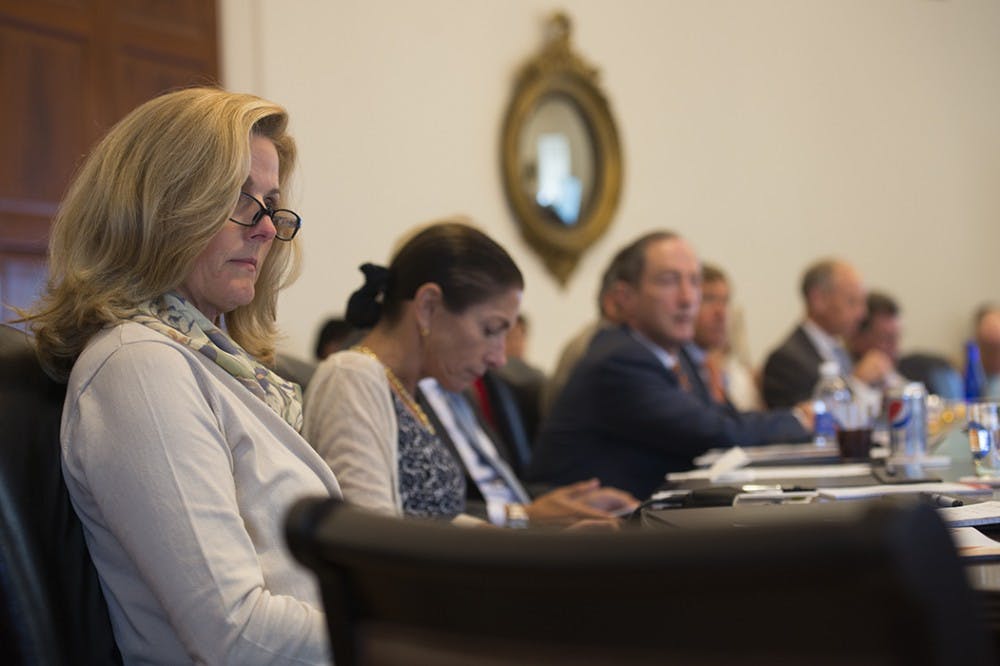The Board of Visitors approved approximately $26 million to be allocated over the next three years between 13 research scholarships. The vote taken Friday was the first with regard to spending money from the Strategic Investment Fund.
Research proposals came from University faculty, were discussed and selected by an ad hoc committee and then handed to the full board for review.
Rector William Goodwin began by putting $26 million in the context of the larger sum amount of the Strategic Investment Fund.
“Whether we approve or not the recommendations we have … if you divide those by three… you’re talking about $8-$9 million a year so this request is not a significant amount from dollars relative to the capability,” Goodwin said.
Goodwin also asked the board to focus on what’s best for the University.
“I think we need and we should have the ability to make ourselves better,” he said. “We don’t have a responsibility here to keep the world happy. We have a responsibility to do what’s best for the University of Virginia and what’s best for the students, what’s best for the faculty, administration [and] alumni.”
Although student input was not a part of the proposal process this time around, the board did recognize a letter sent by Student Council, which listed suggestions for student involvement including a request for students to have the ability to make proposals.
In the letter, Student Council asked for proposals with support from at least 500 students be considered. However, Vice Rector Frank Conner III said he never wanted the process to be elaborate.
“It has always been envisioned — and I promise you this is the case — that one student could make a proposal,” Conner said. “Any student could make a proposal, and it would only take one.”
Student Board member Phoebe Willis, a Law and Darden student, has also been in the process of talking to student leaders to come up with a mechanism that addresses concerns over lack of student input.
“If there are students out there who have ideas, please contact me. I’m willing to meet with everyone,” Willis said. “The board doesn’t know what they don’t know.”
Although the BOV looked at proposals dealing with AccessUVa — a financial aid program at the University — none passed this session.
“We received a number of proposals initially that related to access of affordability, and we looked at these proposals, and they were all good in it of themselves but they were somewhat disparate,” Conner said. “We didn’t really know how they fit with the overall financing program of AccessUVa.”
Several members of the board were in favor of the research proposals, but said they were troubled that AccessUVa was not being dealt with appropriately as it relates to the Strategic Investment Fund.
Board member Kevin Fay spoke out, having asked during previous meetings that more formal proposals dealing with AccessUVa and Affordable Excellence — a model instituted in 2015 which increased tuition intending to make the University more accessible to lower-income students — be dealt with.
“I hear that we’re going to deal with it, but we have no proposals,” Fay said. “That troubles me.”
Fay thought the board should fund good research proposals using money that initially came from sources other than the Strategic Investment Fund.
“I am troubled with going forward with that as part of the Strategic Investment Fund,” Fay said. “I need more information about these conversations … whether it’s additional enrollment, exactly how this is going to affect what we do with AccessUVa and those types of things because they all fundamentally affect how fluid that fund might be — because they affect how that money is going to be spent.”
Board member John MacFarlane III pushed for a line item veto vote and expressed dissatisfaction with the research proposal which would allot $1 million for Darden merit-based scholarships.
“I would rather challenge Darden to address that with philanthropic funds, then come back to us with something that is more significant in terms of its thought leading and research value,” MacFarlane said. “If we do have [a] line item, I would like to propose to amend or that, that item might be struck.”
MacFarlane also inquired as to what the cost of waiting to vote would be, as the first vote often sets a precedent.
“This is our first vote … I think that if any of us have any concerns about any one of those [proposals] I think we should speak now because once this is done it is inked and we have set the precedent for all those that follow,” MacFarlane III said. “I think this is the most important vote we will take, ever, on this fund.”
After several other members spoke, the board approved the 13 research proposals all at once with a voice vote.
The research proposals were approved within the context of a resolution stating that access affordability and student input would be high on the list of things to deal with at the Board’s December meeting.







